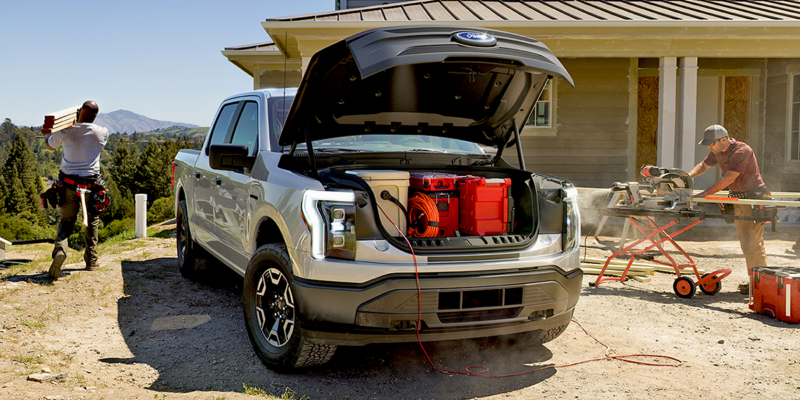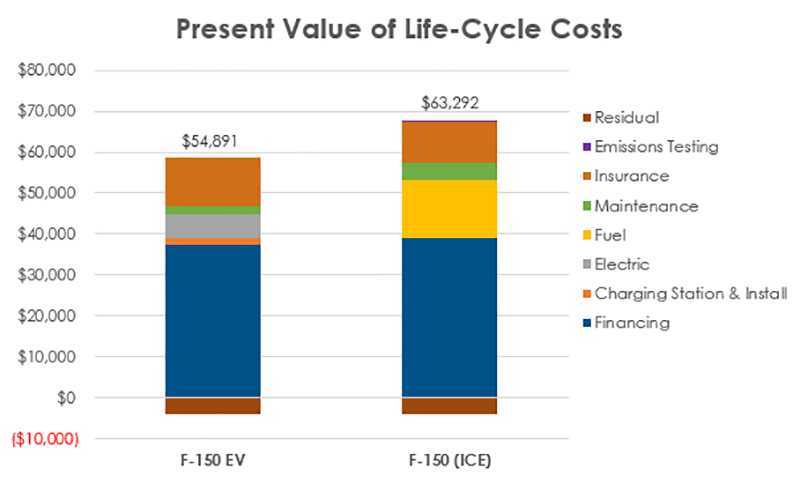Most Popular U.S. Vehicle Struck by Lightning

Americans’ obsession with pickup trucks has made the Ford F-Series the most-purchased vehicle for more than 40 years straight. Pickups were the top three selling vehicles in 2020 and were the top new vehicles purchased in 40 out of 50 states according to Edmunds.
F-150 Lightning Pro To Hit Dealerships in May 2022
Earlier this year, Ford Motor Company announced it would begin selling the F-150 Lightning electric vehicle (EV) pickup truck in May 2022. The auto industry was surprised by Ford’s aggressively low price tag on the F-150 Lightning Pro, its stripped-down work truck model intended to appeal to professional fleet purchasers and value-conscious drivers. Starting under $40,000, not including the federal tax incentive of up to $7,500, the Lightning Pro has a targeted 426 horse power, a range of approximately 230 miles on a full charge and also some standard features that offer extra value that only EV technology can provide.
Ford’s announcement of the F-150 Lightning EV unveiled the first EV pickup truck from a major auto manufacturer. The Lightning is more of an incremental change to the existing F-150 architecture, instead of being designed from the ground up like Tesla’s space-age Cybertruck.
“This is a big deal considering the number of F-Series pickup trucks sold each year. It could really make a difference in EV adoption by consumers and commercial fleets,” CFC Vice President of Industry Research and Consulting Mark Schneider said. “We studied the cost of ownership of the F-150 Lightning EV Pro model and a similarly equipped F-150 pickup with an internal combustion engine (ICE) over a 10-year period. Over that period, we project the EV version could save $8,000 when compared with the ICE version. Lower-cost electricity versus higher-cost gasoline, maintenance costs and purchase price contributed to the lower overall cost of ownership of the EV version.”

Growth of EV sales in the United States accelerated in 2021, hitting new records in the second quarter and surpassing 15 percent share of the passenger vehicle market according to a recent Atlas Public Policy report. June sales surpassed 66,000 EVs, eclipsing the previous monthly record by more than 10,000 vehicles. Market share has also rebounded to 2.5 percent in the first half of 2021 from 1.8 percent in 2020 and 1.4 percent in 2019 according to an InsideEVs report. The EV market is continuing to expand as new models are introduced and become available to purchase. The only wildcard is how supply-chain constraints will affect manufactures ability to build new EVs over the next six to eight months.
Co-op Leaders Share Their Perspectives on EV Pickups
“The difference in initial price between an affordable ICE vehicle and a modest EV has just been too much of a bridge for the majority of our members to cross,” Arizona-based Mohave Electric Cooperative (MEC) CEO Tyler Carlson said. “The financial realities of MEC’s predominantly low to middle-income membership means our consumers most often purchase affordable used or new ICE vehicles.”
While many consumers are priced out of EV purchases due to the lack of affordable options, Montana-based Lower Yellowstone and Mid-Yellowstone Electric Cooperative CEO Jason Brothen has one commercial member that began to plan to electrify a portion of its commercial fleet by 2022.
“The availability of an EV pickup from a major U.S. manufacturer will probably increase member interest in EVs, but members will still need to be convinced it’s a product that can really meet their needs,” Ohio-based Washington Electric Cooperative CEO Jeff Triplett said. “Our members don’t think of EVs as powerful. They need to be convinced that it’s a capable vehicle that they can use to do their jobs and overcome range anxiety.”
Georgia-based Cobb Electric Membership Corporation (EMC) estimates that 2,300 members charge EVs at their homes. Tim Jarrell, Cobb EMC vice president of Power Supply and Planning, attributes the large number of EVs on their system to the urban and technology-savvy members and higher income levels, eliminating the affordability barrier.
“The introduction of an EV pickup truck that is appealing to our members will be a game changer,” Kris Delaney, Cobb EMC vice president of Marketing and Corporate Communications, said. “We’re in between Atlanta and the country, and we love our trucks here.” She added that a less obvious, but compelling, selling point of EV pickups is how the trucks could provide for a better tailgating experience at college football games without the need for a generator running in the background.
Co-ops Plan to Purchase EV Pickups if Limitations Fixed
Leaders from the four cooperatives all shared interest in, or have plans to, incorporate EV pickup trucks into their utility fleet. Each highlighted a specific challenge for an EV pickup truck to meet, including super-duty or heavy-duty enhanced payloads, towing and off-road capabilities and extended range.
Cobb EMC has reserved four F-150 Lightning pickups and intends to use them to support its operations. They will join a roster of EV sedans it uses to educate members about charging, rate options and potential savings.